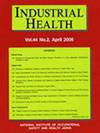Influence of nurse work environment and psychological distress on resignation from hospitals: a prospective study.
IF 1.8
4区 医学
Q3 ENVIRONMENTAL SCIENCES
引用次数: 0
Abstract
With the global nurse shortage, identifying nurse work environments that allow nurses to continue working is a common concern worldwide. This study examined whether a better nurse work environment (1) is associated with reducing nurses' psychological distress; (2) reduces nurse resignations; (3) weakens the influence of psychological distress on their resignation through interaction effect; and (4) whether psychological distress increases nurse turnover. Multilevel logistic regression analyses were performed using data obtained in 2014 from 2,123 staff nurses from a prospective longitudinal survey project of Japanese hospitals. The nurse work environment was measured by the Practice Environment Scale of the Nursing Work Index (PES-NWI) consisting of five subscales and a composite, and psychological distress by K6. All the PES-NWI subscales and composite (ORs 0.679-0.834) were related to K6, significantly. Regarding nurse turnover, K6 had a consistent effect (ORs 1.834-1.937), and only subscale 2 of the PES-NWI had a direct effect (OR 0.754), but there was no effect due to the interaction term. That is, (1) and (4) were validated, (2) was partly validated, but (3) was not. As better work environment reduces K6 and a lower K6 decreases nurses' resignation, high-level hospital managers need to continue improving the nurse work environment.护士工作环境和心理困扰对从医院辞职的影响:一项前瞻性研究。
在全球护士短缺的情况下,确定能让护士继续工作的护士工作环境是全世界共同关心的问题。本研究探讨了更好的护士工作环境是否(1)与减少护士的心理困扰相关;(2)是否会减少护士辞职;(3)是否会通过交互效应削弱心理困扰对护士辞职的影响;以及(4)心理困扰是否会增加护士的离职率。我们利用 2014 年日本医院前瞻性纵向调查项目中获得的 2 123 名护士的数据进行了多层次逻辑回归分析。护士工作环境由护理工作指数实践环境量表(PES-NWI)的五个分量表和一个综合量表测量,心理困扰由K6测量。所有 PES-NWI 分量表和综合量表(ORs 0.679-0.834)均与 K6 显著相关。在护士流失率方面,K6 有一致的影响(ORs 1.834-1.937),只有 PES-NWI 的分量表 2 有直接影响(ORs 0.754),但交互项没有影响。也就是说,(1)和(4)得到了验证,(2)得到了部分验证,但(3)没有得到验证。由于更好的工作环境会降低 K6,而较低的 K6 会降低护士的辞职率,因此医院高层管理者需要继续改善护士的工作环境。
本文章由计算机程序翻译,如有差异,请以英文原文为准。
求助全文
约1分钟内获得全文
求助全文
来源期刊

Industrial Health
医学-毒理学
CiteScore
3.40
自引率
5.00%
发文量
64
审稿时长
6-12 weeks
期刊介绍:
INDUSTRIAL HEALTH covers all aspects of occupational medicine, ergonomics, industrial hygiene, engineering, safety and policy sciences. The journal helps promote solutions for the control and improvement of working conditions, and for the application of valuable research findings to the actual working environment.
 求助内容:
求助内容: 应助结果提醒方式:
应助结果提醒方式:


